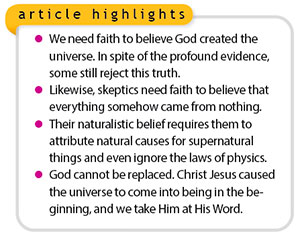 Hebrews 11:3 says, “By faith we understand that the universe was created by the word of God.” Do you find it a little odd that we must have faith to understand that God created the universe? We live in a creation that is bursting at the seams with brilliant, awe-inspiring creativity, complexities beyond comprehension, all wrapped up in unparalleled beauty. Yet, we must still use faith to believe that by the word of God the universe was made. Where else would the universe have come from? Despite clearly perceiving what can be known about God in the things that have been made (Romans 1:20), many have decided to reject faith in the Genesis account of creation and replace God with the astonishing idea that nothing somehow made everything.
Hebrews 11:3 says, “By faith we understand that the universe was created by the word of God.” Do you find it a little odd that we must have faith to understand that God created the universe? We live in a creation that is bursting at the seams with brilliant, awe-inspiring creativity, complexities beyond comprehension, all wrapped up in unparalleled beauty. Yet, we must still use faith to believe that by the word of God the universe was made. Where else would the universe have come from? Despite clearly perceiving what can be known about God in the things that have been made (Romans 1:20), many have decided to reject faith in the Genesis account of creation and replace God with the astonishing idea that nothing somehow made everything.
Out of this theoretical nothing, all matter supposedly sprang forth from a super-dense point called a singularity. Many scientists ignore the fact that nothing can never be anything, and they proceed to build a history to describe how we get from a singularity to a stunningly fine-tuned universe and an earth inhabited with incredible life. Scientists are not simply on a quest for truth to understand the origin of the universe, but are instead constructing this scientific model to fit a faith they already have, a faith that everything began from a nothing’s singularity. They struggle to figure out how to connect the dots.
One consequence for disregarding the Genesis account of creation is that they must assign a natural cause for objects that were supernaturally created. For instance, life is reported to have started with complex organic molecules, which then became RNA replicators, which then became cells, and so on. The Bible describes life as arising from God’s breath of life being breathed into a fully formed body of cells that He handcrafted from dust. Life only comes from life and has no other tenable origin.
The naturalistic explanation for the universe also jumbles the order of creation as spelled out in Genesis. Examples include God creating the earth before the sun whereas modern cosmology has the sun coming into being before the earth. Also, the Bible has the earth forming out of water, but scientists say that after the rocky earth cooled, water arrived when Earth was bombarded with ice-laden comets.
Generally, the current cosmological model asserts that nothing somehow blew up and made all space, time, and matter. That matter then spun and clumped into masses that formed all the stars and planets that we see. Enough time went by that these molecules slowly became oceans, trees, cows, and humans.
Unfortunately, the scientific facts—the data and the systems—that we clearly see all around us do not operate in a manner that could create this beautiful cosmos, but they actually work in the opposite direction and act to wear things out. You also can’t trace a line of continuity from a single point of origin in the universe to everything that exists today by using the laws of physics. To accept this belief, you must appeal to a powerful outside force to create everything, and your reasoning must regularly violate operational laws to form what we see today.
Since nothing can’t give rise to everything and universes don’t build themselves, the Lord Jesus had to specifically create what is seen out of the invisible just like He said He did. We are back to the point of faith, or, more clearly, trust. Outside of the biblical Creator, the universe is devoid of a first cause. He has made it plain there are no other reasonable options. That is why some scientists try to replace Him with nothing. However, we can indeed find the origin of this universe, for God also said, “You will seek me and find me, when you seek me with all your heart” (Jeremiah 29:13).
* Mr. Arledge is Research Coordinator at the Institute for Creation Research.
















